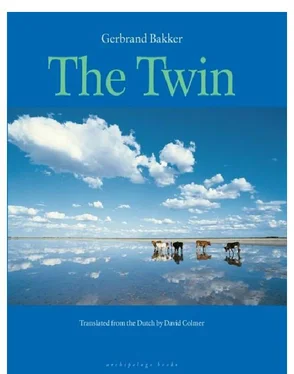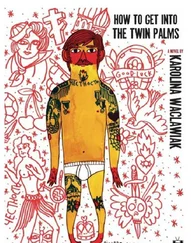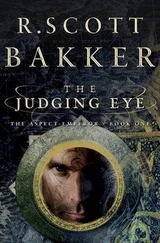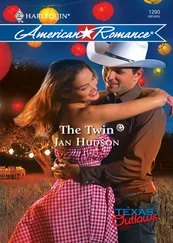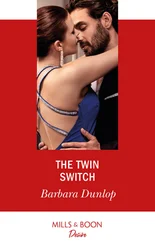He looks around. “Bike pump?”
I get the pump, which is probably pushing twenty as well, out from under the workbench and plug in the strip lights. “Come on,” I say. “I’ll give you some overalls.”
“What do I do?” whispers Father.
“Nothing special,” I say.
“Yeah, but. .”
“What?”
“I’m dead, aren’t I?”
“No, not any more.”
“That boy’s mother. .” He can’t bring himself to say her name.
“Yeah?”
“She thinks I’m dead.”
“There were reasons for that.” I feel sorry for him. I don’t want to — when I’m in his bedroom I don’t want anything — but I still feel it.
“Where is he?”
“He’s in the barn fixing your bike.”
Father is eating a cheese sandwich off a plate he tries to hold under his chin with one trembling hand. I’ve turned on the light. It’s just past three, but the clouds refuse to break. What was I thinking when I moved him upstairs? That it would be the first step to “upstairs” as Riet understood it when I told Ronald where Father was? That here, surrounded by photos, samplers, mushrooms and the ticking of the clock, he would lie back calmly and wait? I walk over to the grandfather clock, open the door and pull up the weights.
I imagine Riet cooking in the kitchen; she’s already turned on the light. Everywhere something is happening: Father is lying here; for the moment I’m not sure where I am; Henk is in the barn, in the light as well, at work; the cows are standing calm and serene in the cowshed; in the donkey shed the donkeys are eating winter carrots out of Teun and Ronald’s hands; the twenty sheep are lying down near the Bosman windmill; Ada drops by, drinks a coffee with Riet and asks her whether she’d like to come over tomorrow to see her newly completed willow-shoot bank; the buzzing of the electric clock in the kitchen is less and less penetrating; the winter is far from over. And, of course, I know where I am too: I’m fixing the bike together with Henk, and Riet is more mother than wife.
“That old rattletrap,” says Father.
“Yes, but it’s not worn out yet.”
“What’s he like?”
“I don’t know yet.”
“That’s what you said last time.”
“Whatever,” I say. I take the plate out of his hand and walk to the door. “Light on?”
“Light on,” says Father.
“I’ll send him in to you for a moment this evening.”
“I don’t know. .”
“We can hardly act like you don’t exist?”
“No.”
The bike is upside-down in front of the workbench. Henk is squatting before it. He’s wearing a pair of Father’s old overalls, faded green with big patches on the knees, the collar turned up. He’s got the chain soaking in a container next to the bike, in diesel by the looks of it. The tires are pumped up. He looks up at me as I approach. There is a black smudge on his jaw. Now he’s down low, I see that he has his mother’s mouth.
“It needs a new back mudguard,” he says.
“I can buy one,” I say.
“And the tires are almost perished.”
“If they’ve really had it, I can buy new tires too.”
“The chain’s soaking in diesel.”
“Did you siphon it out of the tank?”
“Yep.”
Not once has he come to me with a question. What does that say about him? I don’t know.
We eat kale with smoked sausage and mash. Once I’ve started on the kale, I eat it at least twice a week. The supply in the vegetable garden lasts until deep into the winter. Mother always put a beef stock cube in with the potatoes, I use vegetable. I buy the smoked sausage from the butcher. I have a lot of stuff in the deep freeze, but no pork.
“Mr. van Wonderen?”
“Yes?”
“Do you have any wine to go with this?”
“Wine?”
“Red wine. It’s good with kale.”
“No, I don’t have any wine. Only spirits.”
He spoons a large portion of mustard out of the jar. After loading his fork with mash and kale, he smears a dab of mustard over it with his knife. He spears the sausage without mustard.
“Listen, Henk. .” Before I go on, I take a mouthful. Saying his name was an obstacle.
“Yes?”
“Can you stop calling me Mr. van Wonderen?”
“Okay.”
“It’s Helmer.”
“Helmer,” he says. He takes a mouthful of water, then says, “Difficult.”
“What’s difficult about it?”
“It’s an unusual name. It sounds young.”
“Henk’s a difficult name for me.”
“Why?”
“My brother was called Henk.”
“Oh, yeah.”
“You’re named after him.”
“No I’m not.”
“No?”
“I’m named after one of my father’s uncles, but a generation back.”
“A great-uncle.”
“Is that a great-uncle?”
“Yes. Who told you that?”
“My father.”
“Did you know that my brother was called Henk?”
“Yeah, my mother told me a bit about him. But not when I was little, much later.” He thinks for a moment. “I think it was only last year.”
“More sausage?”
“Yes, please.”
I cut off a piece of sausage and lay it on his plate. A car drives by.
“Why aren’t the curtains closed?”
“Who’s going to look in here?”
Henk looks straight ahead, at the side window. I see him gazing at his reflection.
“With a telescope I could look right into that house over there.”
“The neighbor who made the jam lives there.”
“Has she got a telescope?”
“Probably.”
We eat in silence for a while.
“In Russia they eat donkeys,” he says.
“What?”
“Donkeys. In Russia they eat them.”
“How do you know?”
“I dunno, I read it somewhere.”
“Russians are barbarians.”
“Hmm.” He lays his cutlery on his plate and pushes it away. He crosses his arms and looks at himself in the window. I pick up the plates and put them on the draining board. I get the washing-up basin out of the cupboard under the sink and fill it with hot water.
“There’s food left over,” says Henk.
“That’s for my father.” I’m standing with my back to him. He doesn’t say anything. I slip the plates and cutlery into the washing-up basin. It’s still quiet behind me. I turn around. His arms aren’t crossed any more and he’s sitting straighter on the chair. He’s staring at me. If he hadn’t been here, I wouldn’t have filled the washing-up basin with hot water yet.
“My father,” I say again.
“Is there someone else in the house?”
“Yes.”
“Your father. I thought. .”
“What?”
“When you said, “He can’t ride a bike any more”. .”
“Yes?”
“And that bike’s so old. I thought. .”
“What did you think?”
“I thought he died ages ago.”
“No.”
“Christ. Where is he then?”
“Upstairs.”
“Where the light was on when we drove up?”
“Yep.”
“Is there something wrong with him?”
“He’s old. His legs are clapped out.”
“How old?”
“In his eighties. He’s starting to go downhill mentally as well.”
“Christ.”
I picture Riet and Henk at home in the village in Brabant. They live there together, but I find it impossible to imagine them in one room. When one walks in somewhere, the other walks out, doors opening and shutting simultaneously. They hardly exchange a word. That’s good for me, I have less to explain than I expected.
“Let’s take his dinner up to him now,” I say, “before it gets cold.”
“What, me too?”
“You too.”
He looks at me as if I’ve asked him to lay out a dead body.
Читать дальше
